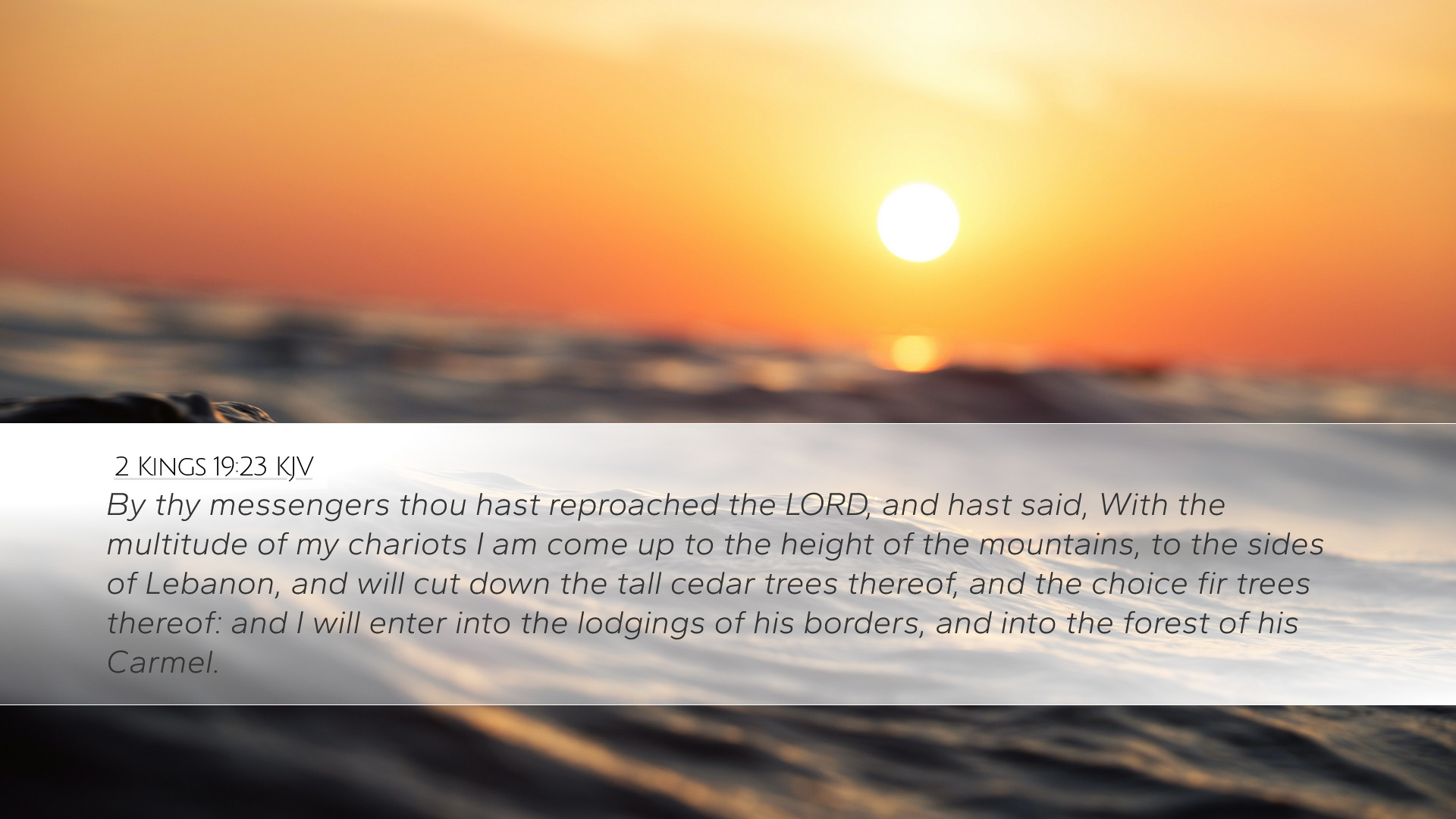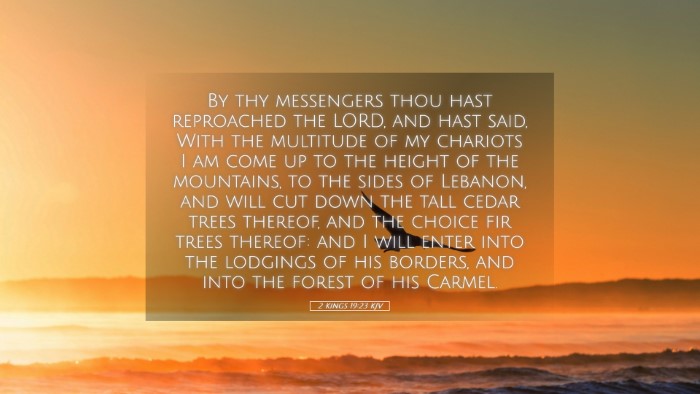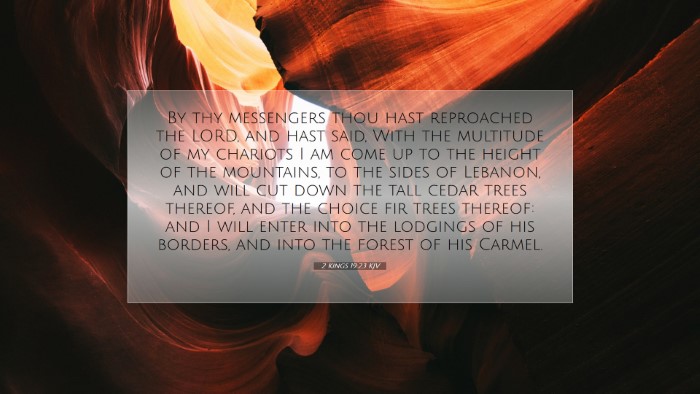Commentary on 2 Kings 19:23
Bible Verse: "By thy messengers thou hast reproached the Lord, and hast said, With the multitude of my chariots I am come up to the height of the mountains, to the sides of Lebanon; and I will cut down the tall cedar trees thereof, and the choice fir trees thereof: and I will enter into the lodgings of his borders, and into the forest of his Carmel."
Introduction
This verse is a powerful declaration of the Assyrian king Sennacherib's arrogance and blasphemy against God. It showcases the confrontation between divine sovereignty and human pride. The significance of this moment is profound, providing a rich tapestry of theological implications for pastors, students, and scholars alike.
Context and Background
To fully appreciate 2 Kings 19:23, one must consider its historical and theological context. The events recorded in this chapter take place during a time of great distress for the kingdom of Judah. The Assyrian Empire, under Sennacherib, was a dominant power, having already captured several cities of Judah. This context establishes the pressing threat faced by King Hezekiah and his people.
Historical Context
Assyria was notorious for its conquests and brutality. Sennacherib, attempting to assert his dominance, sends messengers to Jerusalem with a taunt directed at Hezekiah and the God of Israel. This was not merely a military threat; it was a spiritual challenge that called into question the power and sovereignty of God.
Theological Implications
This verse reveals the spiritual conflict inherent in the narrative. Sennacherib's claim stands in direct opposition to God's promise of protection to the people of Judah. His blasphemy serves as a vehicle for discussing the nature of God, the reality of human pride, and the profound truth of divine sovereignty.
Commentary Insights
Matthew Henry's Commentary
Matthew Henry emphasizes the audacity of Sennacherib’s words. He notes that the Assyrian king boasts of his military might: "With the multitude of my chariots I am come up…" Henry sees this as a reflection of human pride that leads to a fall. He further states that Sennacherib’s attempt to overtake the height of the mountains indicates his desire to ascend to heavenly positions, akin to a rebellion against God's authority.
Albert Barnes' Commentary
Albert Barnes points out that Sennacherib's reproach was not merely against Hezekiah but against God Himself. He suggests that this verse illustrates a characteristic trait of prideful rulers who believe they can challenge divine authority. Barnes elaborates that the regions Sennacherib mentions, such as Lebanon and Carmel, are symbols of strength and beauty, representing the height of creation that he presumed to conquer as he sought greater authority than God’s will.
Adam Clarke's Commentary
Adam Clarke provides an exegetical analysis, considering the linguistic nuances of the text. He highlights the metaphorical language regarding the "tall cedar trees" and "choice fir trees." Clarke interprets these as emblems of strength, indicating that Sennacherib sought to cut down not just trees, but the very ideals associated with God’s creation. This serves as a significant reminder of the fragility of human ambitions when set against divine sovereignty.
The Reproach Against God
This verse explicitly identifies the reproach directed at the Lord. It is a reminder of how human arrogance can lead to the derision of God’s name. The implications are critical for modern-day faith communities, as they challenge believers to recognize the humility needed when encountering divine power.
Understanding Reproach
- Divine Sovereignty: The reproach against God illustrates His unmatched power and the audacity of humanity to perceive itself as equal or superior.
- Human Pride: Sennacherib’s confidence in his military strength serves as a cautionary tale about the nature of pride that leads nations and individuals to oppose God.
- Spiritual Warfare: The passage serves as an ontological battle ground between the kingdom of darkness and God's dominion, stressing the significance of spiritual discernment in contemporary faith crises.
Applications for Today
For pastors and theologians, 2 Kings 19:23 provides rich material for sermons and studies focusing on the nature of God’s sovereignty in the face of adversity. Here are several applications:
- Recognizing God's Authority: Believers should learn to approach life’s challenges with the understanding that God is sovereign over all earthly powers.
- Humility in Prayer: Just as Hezekiah turned to God in prayer, modern believers are reminded of the necessity and power of earnest prayer in times of trouble.
- Responding to Blasphemy: The church is called to discern and respond to modern-day "reproaches" against God, standing firm in faith while maintaining grace and love.
Conclusion
2 Kings 19:23 serves as a striking reminder of the natural human inclination toward pride and the resultant folly of opposing God's sovereignty. The combined insights from public domain commentaries underline the timeless relevance of this passage, encouraging a deeper reflection on our own hearts and societies. As we navigate our faith journeys, let us remain steadfast in recognizing the place of God in our lives and the futility of any prideful assertion against His unmatched greatness.


